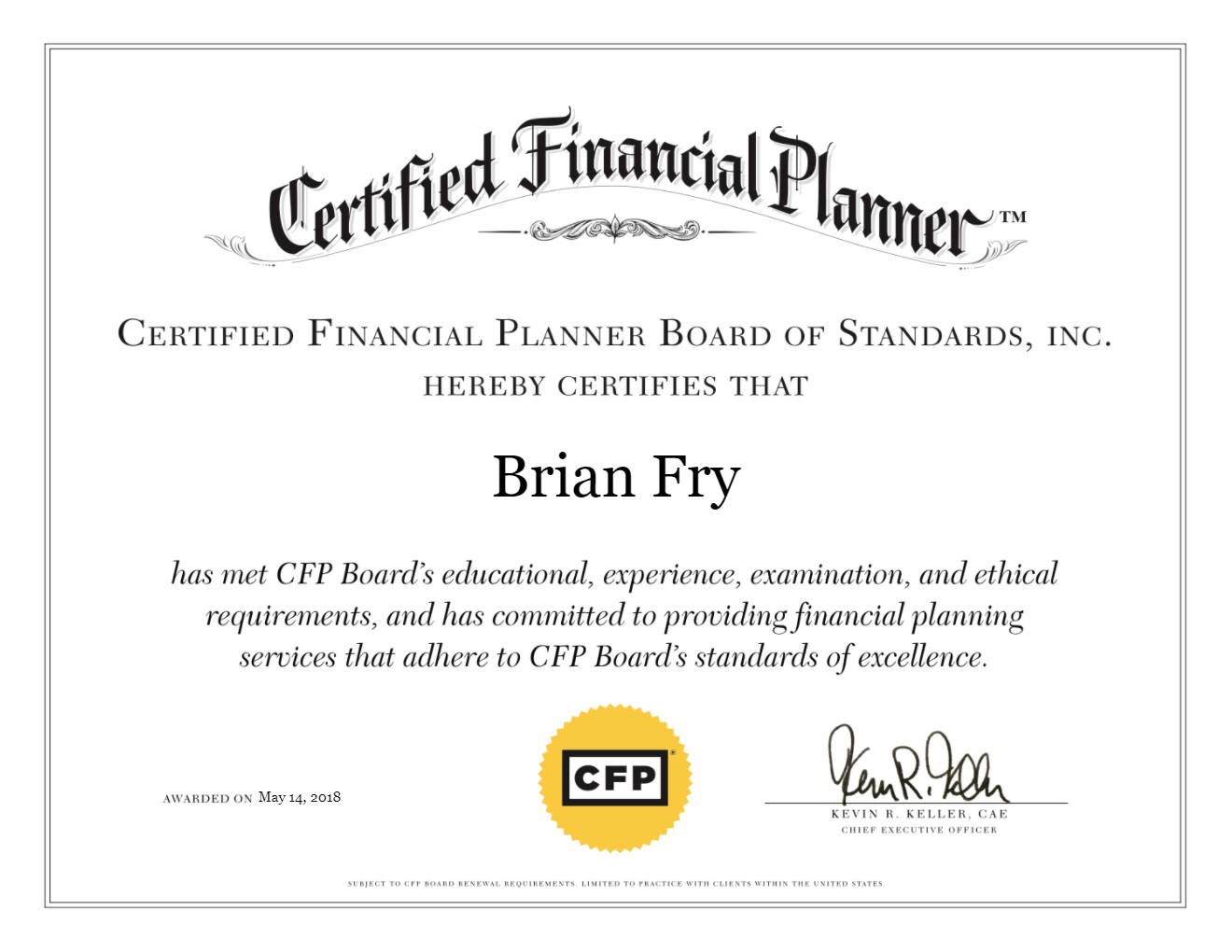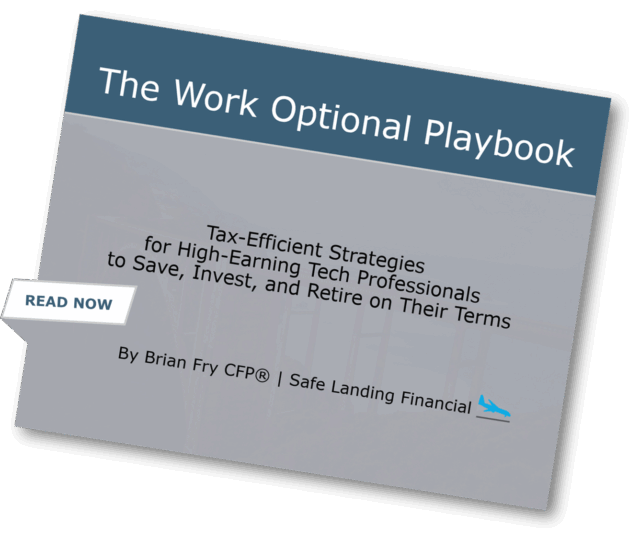Why Working With a CERTIFIED FINANCIAL PLANNER™ is Important (CFP® Professional)
A CFP® professional holds an expertise in financial and investment planning and earned their marks from the Certified Financial Planner Board of Standards, Inc. Are you working with a CERTIFIED FINANCIAL PLANNER™ or looking to work with one?
What is the difference between a CFP® professional and a financial advisor?
A CFP® professional is one of many types of financial advisors. A financial advisor must earn the right to call themselves a CFP® professional. Anyone can call themselves a financial advisor, because it’s a general term.
Here are a few considerations to why one might consider working with a CFP® professional.
Credentials
A financial advisor that earns the rights to use the CFP® marks shows an expertise towards financial planning, a level of professionalism, and distinguishes themselves for clients. If working with a qualified financial advisor is important to you, then make sure they are a CFP® professional.
Education
A CFP® professional is required to show a commitment towards continuing education. There is no requirement a financial advisor to earn a college degree or receive advanced financial planning education. If working with an educated financial advisor is important to you, then make sure they are a CFP® professional.
Experience
A financial advisor must accumulate approximately three years of work experience before using the CFP® marks. There is no requirement for financial advisor to have work experience before selling securities. If working with an experienced financial advisor is important to you, then make sure they are a CFP® professional, and ask how long they have been offering financial advice.
Ethics
A financial advisor must adhere to a higher ethical standard and serve clients as a fiduciary when providing financial advice to clients before using the CFP® marks. Most financial advisors are not held to similar ethical or fiduciary standards. If working with an ethical financial advisor is important to you, then make sure they are a CFP® professional.
What percentage of financial advisors are CFP® professionals?
About 30% of financial advisors in the United States are CFP® professionals.
There are approximately 617,549 registered representatives eligible to sell securities in the United States, according to FINRA.1 There are approximately 330,300 personal financial advisors in the United States according to US Bureau of Labor.2 There are 98,883 CFP® professionals in the United States according to the Certified Financial Planner Board of Standards, Inc. 3
Is my financial advisor a CFP® professional?
Here are two ways to confirm that your financial advisor is a CFP® professional.
First, you can go to the CFP Board’s verification page.
Second, you may find a digital certificate (see image below) displayed on their website. There should be a separate link to verify.

How does a financial advisor become a CERTIFIED FINANCIAL PLANNER™?
According to the CFP Board, typically, it takes 18-24 months to become a CFP® professional. To become a CFP® professional, a financial advisor must meet requirements for education, exam, experience, and ethics.
Education
To satisfy the education requirement, a financial professional must first earn a bachelor’s degree from an accredited college or university.
Then, a financial professional must complete a CFP board educational program consisting of classes focused on: financial planning process and insurance, investment planning, income tax planning, retirement planning and employee benefits, estate planning, and financial plan development. Certain professionals may qualify for an accelerated education path.
Exam
To satisfy the exam requirement, a financial professional must pass the CFP® exam consisting of a six-hour multiple choice exam.
Experience
To satisfy the experience requirement, a financial professional must accumulate 6,000 hours of professional experience related to the financial planning.
Ethics
To satisfy the ethics requirement, a financial professional must adhere to high ethical and professional standards for the practice of financial planning, and to act as a fiduciary when providing financial advice to clients.
What is CFP Board’s financial planning process?
A CERTIFIED FINANCIAL PLANNER™ must follow the CFP Board’s seven-step financial planning process. Depending on the arrangement you’ve worked out with your financial advisor, this process may be of finite or indefinite duration.
- Understanding the Client’s Personal and Financial Circumstances
- Identifying and Selecting Goals
- Analyzing the Client’s Current Course of Action and Potential Alternative Courses of Action
- Developing the Financial Planning Recommendation(s)
- Presenting the Financial Planning Recommendation(s)
- Implementing the Financial Planning Recommendation(s)
- Monitoring Progress and Updating
What designations should my financial advisor have?
A financial advisor is a generic job title. The financial services industry is filled with a wide array of similarly generic titles.
Professional designations provide a better opportunity for financial advisors to show they are qualified.
There are many three or four-letter acronyms you might see after a financial advisor’s name. Not all designations are created equal and many have different or inconsistent requirements.
When looking for a qualified financial advisor, here are the three most meaningful designations: CFP®, CFA, and CPA.
CFP® – CERTIFIED FINANCIAL PLANNER™
The CFP® designation is considered the gold standard of financial planning.
CFP® exam education focuses on financial planning process and insurance, investment planning, income tax planning, retirement planning and employee benefits, estate planning, and financial plan development.
CFA – Chartered Financial Analyst
The CFA designation is considered the gold standard of investment analysis.
CFA exam education focuses on ethical and professional standards, quantitative methods, economics, financial reporting and analysis, corporate finance, equity investments, fixed income, derivatives, alternative investments, and portfolio management.
CPA – Certified Public Accountant
The CPA designation is considered the gold standard of accounting.
CPA exam education focuses on auditing and attestation, business environment and concepts, financial accounting and reporting, and regulation.
Is a CERTIFIED FINANCIAL PLANNER™ a fiduciary?
A CERTIFIED FINANCIAL PLANNER™ is held to a higher standard than other financial advisors.
A CERTIFIED FINANCIAL PLANNER™ is required to serve as a “fiduciary at all times” when providing financial advice.
A CERTIFIED FINANCIAL PLANNER™ that works for an independent fee-only Registered Investment Advisor limits conflicts of interest in providing advice.
However, most CFP® Professionals are brokers, meaning they collect commissions and sell products, creating additional conflicts of interest.
While a CERTIFIED FINANCIAL PLANNER™ is required to serve as a fiduciary, consider the importance of limiting additional conflicts of interest when searching for a fiduciary financial advisor.
How can I learn more about the CFP® certification?

“CERTIFIED FINANCIAL PLANNER™ certification is the standard of excellence in financial planning. CFP® professionals meet rigorous education, training and ethical standards, and are committed to serving their clients’ best interests today to prepare them for a more secure tomorrow.”
– The Certified Financial Planner Board of Standards, Inc.
More Resources
Mega-Backdoor Roth Guide + Flowchart
RSU Guide + Strategy After Vesting
Backdoor Roth Guide + Flowchart
HSA Guide for Triple-Tax Advantage
Deferred Compensation Guide
1 FINRA Statistics as of 12/31/2020
2 US Bureau of Labor estimated in 2021
3 CFP Board Professional Demographics as of 4/1/2024
Certified Financial Planner Board of Standards, Inc. Code of Ethics
CERTIFIED FINANCIAL PLANNER™ for Tech Professionals



